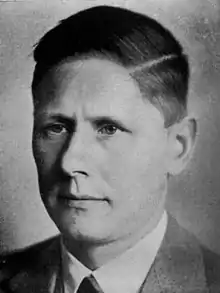
Ernst Waldschmidt 1938
Ernst Waldschmidt (July 15, 1897, Lünen, Province of Westphalia – February 25, 1985, Göttingen) was a German orientalist and Indologist. He was a pupil of German indologist Emil Sieg.
He taught at Berlin University and began teaching at the University of Göttingen in 1936. Waldschmidt joined the Nazi party in May 1937 and became a member of the National Socialist German Lecturers League in 1939.[1]
He was a specialist on Indian philosophy, and archaeology of India and Central Asia. He also founded Stiftung Ernst Waldschmidt.
Literary works
- Buddhistische Kunst in Indien, 1932
- Die buddhistische Spätantike in Mittelasien (the 7th Volume), 1933
- Gandhara, Kutscha, Turfan, 1925
- Die Überlieferung vom Lebensende des Buddha, 2 Vols., 1944-1948
References
- ↑ Szabó, Anikó (2000). Vertreibung, Rückkehr, Wiedergutmachung: Göttinger Hochschullehrer im Schatten des Nationalsozialismus (in German).
Bibliography
- Härtel, Herbert (1987). "Ernst Waldschmidt (1897-1985)". Zeitschrift der Deutschen Morgenländischen Gesellschaft. 137 (1): 6–11. – via JSTOR (subscription required)
- Bechert, Heinz (1986). "Ernst Waldschmidt (1897-1985) (Obituary)". Journal of the International Association of Buddhist Studies. 9 (1): 147–149.
External links
- http://titus.uni-frankfurt.de/personal/galeria/waldschm.htm (pictures)
- https://archive.today/20120906182336/http://www.indologie.uni-goettingen.de/cms/index.php?id=13 (in German)
This article is issued from Wikipedia. The text is licensed under Creative Commons - Attribution - Sharealike. Additional terms may apply for the media files.